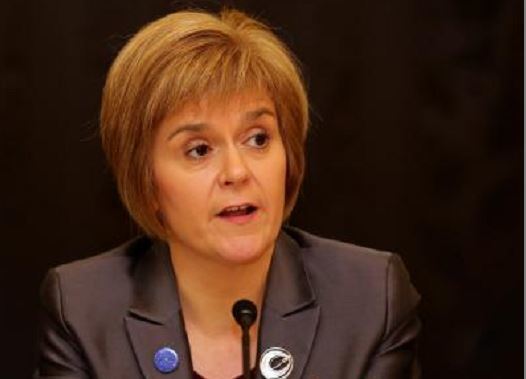
Scotland is putting forward plans to remain in Europe’s single market after vowing to seek independence from the U.K. should its voice be ignored in Brexit talks.
First Minister Nicola Sturgeon on Tuesday will detail her semi-autonomous government’s red lines on keeping access to free trade and labour as the U.K. heads into talks on withdrawing from the European Union next year. She reiterated at the weekend her stance on calling for a fresh vote on breaking away from England and Wales if Scotland’s demands aren’t met.
“Losing our place in the single market would be potentially devastating to our long-term prosperity, to jobs, investment and people’s livelihoods,” Sturgeon said in a statement before the publication of a Scottish government paper on the issue. “Our proposals deserve full and proper consideration.”
It leaves British Prime Minister Theresa May fighting on two fronts and, potentially, having to confront two divorces from unions that looked solid less than a year ago. Scots chose to remain in the U.K. in an independence referendum in 2014 but the nationalist leadership renewed its push for full autonomy after the Brexit vote on June 23.
All of Scotland’s regions voted to remain in the EU while the U.K. as whole decided to leave, a result that Sturgeon called “democratically unacceptable.” She then asked her ministers to prepare legislation on another independence vote that could be accelerated through the Scottish Parliament.
More Control
In its policy paper, which Sturgeon said involved compromise, the government in Edinburgh is expected to lay out how it wants the U.K. to cede control of policies on such things as immigration, more areas of finance and trade so Scotland can forge its own path with the EU. That’s if the U.K. opts for what’s become known as a “hard Brexit” and leave the bloc without access to the single market.
“Our hope is that the U.K. will remain within the single market,” Sturgeon wrote in the Financial Times. “Unfortunately, the rhetoric emanating from a U.K. government that appears ever more in thrall to hardline Brexiters does not inspire great optimism that this option will be chosen.”
While the focus has been on the pressure mounting on May, who said on Monday she would listen to Scottish demands “very seriously,” Sturgeon’s gambit doesn’t come without risks.
Read More: A QuickTake on Scotland’s Independence Push
Should Sturgeon go for a bespoke EU deal, there are sizable legal and practical hurdles involved in Scotland establishing separate legislation to the rest of the U.K. on the labour market and for businesses given the open border with England, its biggest trading partner.
When it comes to independence, the most recent polls show a majority of Scots still want to remain in the U.K. and aren’t even sure if they want another referendum on leaving it.
So if the U.K. government balks at Scotland’s demands and then pursues a Brexit deal that’s unpalatable for Edinburgh, Sturgeon may find herself in another referendum campaign yet with similar question marks over Scotland’s currency and financial health following the decline in North Sea oil revenue.